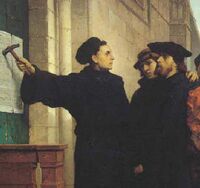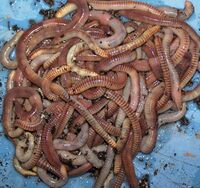The Reformation
The Reformation is the fancy name of an event in 1517, when an Augustinian monk in the Holy Roman Empire invented the pin-up. The first thing he pinned up was a speech about peace, harmony and having a dream. An hour later, he came back and replaced it with a PowerPoint slide with 95 bullet points attacking the Papacy, selling fake passports for entry to heaven, and why there was a Jewish conspiracy to prevent him from getting a job teaching Real Tennis to the local nuns.
The man's name was Martin Luther and he is credited to starting a religious/political/social/kill joy era known as 'The Reformation'.
Origins[edit]
Luther felt he had 'missed' the Renaissance and never got to meet the right people. He blamed everyone for this, including Pope Leo X. When a big party at the Vatican led to excitable priests smashing up old St. Peter's, Pope Leo X organised a Europe-wide whip round to replace it with a new church. Luther suggested a caravan would do, as he was sure the End of the World was imminent. So when Papal fundraisers came around with a golden begging bowl in his town of Wittenberg in Saxony, the German bruiser rebelled.
Others in Germany and Switzerland agreed with Luther and demanded a wholesale purge of the Catholic Church. Another reformer, Ulrich Zwingli, went further and encouraged his followers to pull down statues. In Rome, Pope Leo said everyone in Germany was a heavy drinker and that Luther was an alcoholic, therefore, followers were merely hearing the ravings and rantings of a drunk in the street. Luther sent a bottle of piss to Leo in reply.
Diet of Worms[edit]
The reformers or 'Protestants' asked to meet Holy Roman Emperor Charles V at a local hotel near the Rhine. The emperor gave them not only an audience but a buffet dinner, but the Protestants refused to touch it. One preacher said he 'would rather eat worms' than any food that had been prepared by Catholics. This got the meeting its name and marked the first split between the 'Free Christians' and the 'Rome Christians'. Emperor Charles V offered Luther and others a free passage to Rome to say all this in front of Pope Leo, but the Protestants were wary of going there as there might be an impromptu heretic pot roast.
Finally, Luther agreed to go, under the protection of his friend, the Duke of Saxony. First chaining himself to his friend and then, for good measure the emperor too, Luther laid out the Protestant demands:
- Eating and drinking Jesus is bad for your health.
- Monks and nuns are time wasters.
- I have a book coming out in German, titled Der Deutsch Bible, signed copies available after the meeting.
The bishops urged Charles V to have Luther and other 'Protestants' arrested and have their testicles crushed, but Luther slipped out through a window and said he would never again attend such a meeting, free eats or no.
Let's do the Münster Mash[edit]
Luther's general dismissal of the Pope's authority led to a rebellion in the German city of Münster. Three of Luther's followers gained control of the city from the local bishop and proclaimed they were going to create the first Protestant City. Their leaders believed that if the right conditions were created, Jesus would come down from Heaven and led a rebellion or at least a hoot night. But first, everyone needed a holy bath! In the spirit of John the Baptist, the leaders jumped naked into a fountain and declared they were now saved. Everyone who refused to follow was a heretic and chased from the city.
Reformation elsewhere[edit]
Catholic bashing now spread to other countries. In Denmark and Sweden, frozen meatballs were thrown at Papal representatives. In Scotland, a football club was created especially to sing anti-Catholic songs, whilst the English preferred to exclude all Catholics from Christmas.
Other countries couldn't decide. The French quarreled and punched themselves as a serious political force for 40 years from 1558-1598. The Protestants there were called the Hueys as everytime the Catholics thought about them, they had to stick their heads down the lavatory pan. So bad was the situation that the charlatan-astrologer Nabisco Nostrodamus spent a life on cornflakes to prevent being served poisoned porridge by Queen Catherine de Medici.
In Germany, there was one last great religious war in the 17th century, but after 1648, everyone decided that fighting over which way to hold a Communion cup was very silly. They instead waited to have their knowledge base widened. This was provided by Sir Isaac Newton, who proved that Gravity was religiously neutral.


